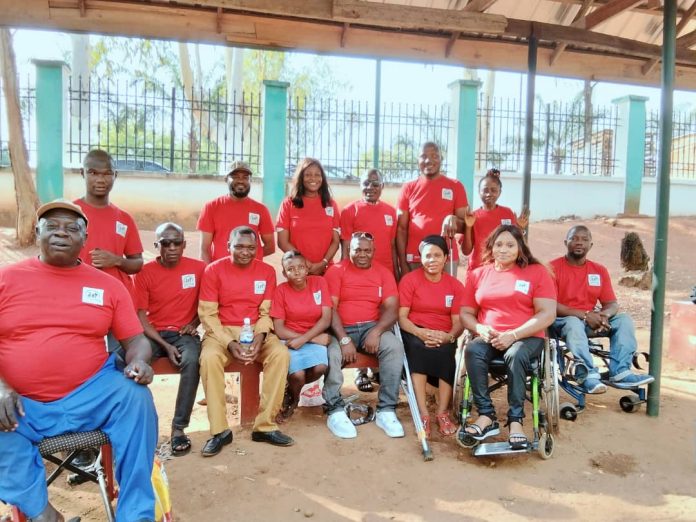Enugu, Nigeria — As Enugu State Governor, Dr. Peter Ndubuisi Mbah, marks his 53rd birthday, the state’s disability community has extended heartfelt congratulations while simultaneously raising pressing concerns over a new transportation policy that threatens their mobility and livelihoods.
In a statement issued by the Enugu State Chapter of the Joint National Association of Persons with Disabilities (JONAPWD), the association expressed deep appreciation for Governor Mbah’s leadership, lauding his administration’s commitment to inclusion, particularly his December 2024 public declaration promising the inauguration of the long-anticipated Enugu State Disability Commission within the first quarter of 2025.
According to Comrade Onyebuchi Mba, Chairman of JONAPWD Enugu Chapter, the disability community is optimistic about Governor Mbah’s vision for an inclusive Enugu, as demonstrated by previous pledges and initiatives aimed at improving the lives of persons with disabilities (PWDs) in the state.
“Governor Mbah has been a beacon of hope to our community. His leadership gives us confidence that Enugu is moving towards a more equitable society. On behalf of all persons with disabilities in the state, we extend our warmest wishes on his 53rd birthday and pray for continued strength, wisdom, and protection as he leads us forward,” Comrade Mba stated.
A Looming Concern: New Transportation Policy Sparks Alarm
However, while celebrating the governor’s milestone, JONAPWD seized the opportunity to draw attention to a policy development that has left many in the disability community worried and anxious. The association expressed strong concerns regarding the recent alleged plan by the state government to restrict tricycles (popularly known as Keke) and minibuses from operating within the Enugu metropolis, effective March 30, 2025.
While acknowledging the government’s intentions to modernize and regulate transportation systems for the benefit of the general public, JONAPWD argues that the policy appears to ignore the unique mobility needs and economic realities of persons with disabilities.
“This policy, though well-meaning in its goals to improve traffic flow and security, inadvertently marginalizes persons with disabilities who rely heavily on tricycles and minibuses for daily transportation,” Comrade Mba lamented.
Disproportionate Impact on the Disability Community
Persons with disabilities in Enugu already face significant hurdles in accessing affordable, reliable, and accessible transportation options. According to JONAPWD, many PWDs rely on Keke and minibuses due to their flexibility and cost-effectiveness, given the lack of accessible public transportation infrastructure in the state.
“Removing tricycles and minibuses without offering a clear, disability-friendly alternative will severely restrict our members’ ability to commute, attend school, access healthcare, conduct business, and participate meaningfully in society,” the statement read.
The association also highlighted that beyond mobility, the new policy would likely exacerbate economic hardship. Many persons with disabilities operate tricycles and minibuses as drivers or rely on them for affordable livelihoods. Banning these modes of transportation without integrating inclusive solutions will, JONAPWD warns, deepen poverty and social exclusion among the disability community.
A Call for Inclusive Policy-Making
In light of these concerns, JONAPWD is appealing to the Enugu State Government to reassess the policy and ensure that it aligns with principles of equity, inclusivity, and social justice.
The association outlined specific requests:
- Accessible Alternatives: Ensure that any replacement transportation system, such as proposed BRT buses, is designed to be fully accessible to persons with various forms of disabilities, including wheelchair users and individuals with visual or hearing impairments.
- Discounted and Affordable Fares: Introduce subsidies or discounted fares for persons with disabilities to prevent transportation costs from becoming an additional burden.
- Stakeholder Engagement: Actively consult and engage with organizations representing persons with disabilities before implementing transportation policies. Their input is crucial in ensuring the voices and needs of the disability community are reflected in governance decisions.
“Inclusion must not be an afterthought. As a state that prides itself on progressive leadership, we urge the government to demonstrate empathy, compassion, and adherence to global best practices by integrating disability-inclusive strategies into its transportation reforms,” Comrade Mba emphasized.
Looking Ahead: Disability Commission in Focus
JONAPWD remains hopeful that Governor Mbah’s administration will use this opportunity to reaffirm its commitment to disability rights by taking deliberate steps to address their concerns. The association also reiterated its anticipation of the formal inauguration of the Enugu State Disability Commission, as promised, which will serve as an institutional mechanism to mainstream disability inclusion across all sectors in the state.
As Governor Mbah celebrates another year of impactful leadership, JONAPWD’s message is clear: True development is incomplete without the full inclusion and empowerment of persons with disabilities.


